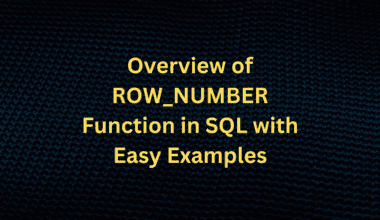Summary: While a degree is often preferred, it is possible to become a statistician without formal education. Pursue self-learning through online courses, build a portfolio with personal projects, gain practical experience through internships, and earn industry certifications to demonstrate your skills.
Introduction
Statistical is a mathematical branch that deals with collecting, analysing and interpreting data and presenting it mathematically. With the help of these data, statisticians tend to solve economic, social and business problems. Different industries like healthcare, insurance, banking, legal, etc., benefit from statistics hence, job opportunities in Statistics are increasing.
By using effective statistical methods, statisticians solve business problems of the real world. It plays an important role even for research and scientific studies. Recently, the demand for statisticians has increased in the world because of the large influx of data, requiring executives to make data-driven decisions.
If you are aspiring for a career in becoming a statistician and experience potential growth, acquire decent salary and maintain a healthy work-life balance, the job role is a perfect fit.
Those who are willing to pursue a certification course in statistics can explore the details by clicking here.
Statistician Job Role and Responsibilities
Statisticians play a crucial role in collecting, analysing, and interpreting data to inform decision-making and solve problems across various industries.
The specific job role and responsibilities of a statistician can vary depending on the industry, organisation, and level of experience. However, she points out some common job roles and responsibilities associated with statisticians:
Design and implement data collection methods, such as surveys, experiments, or observational studies. Clean and preprocess data to ensure its quality and reliability.
Statistical Analysis
Apply statistical techniques to analyse data, including descriptive statistics, hypothesis testing, regression analysis, and machine learning algorithms. Develop and implement statistical models to answer specific research questions or solve problems.
Experimental Design
Plan and execute experiments, ensuring proper randomization and control groups to gather meaningful data. Analyse experimental results and draw conclusions based on statistical analysis.
Data Visualisation
Create clear and informative data visualisations, such as graphs and charts, to communicate findings to non-technical stakeholders.
Statistical Software and Tools
Use statistical software like R, Python, SAS, or specialised tools to conduct Data Analysis and generate reports. Stay updated with the latest tools and techniques in the field of statistics and Data Analysis.
Interpretation and Reporting
Interpret the results of statistical analyses in the context of the problem being addressed. Prepare written reports, presentations, and visual aids to communicate findings to colleagues, clients, or decision-makers.
Statisticians can work in a wide range of industries, including healthcare, finance, government, academia, marketing, environmental science, and more. The specific responsibilities may vary considerably depending on the sector and the organisation’s goals.
How to become a Statistician in India?
Becoming a statistician typically involves a combination of education, training, and practical experience. Here is a detailed guide for you to understand how to become a statistician. Here are the steps you can follow to become a statistician:
Educational Requirements
Start by earning a bachelor’s degree in statistics, mathematics, or a related field. While a bachelor’s degree in statistics is ideal, you can also major in fields like mathematics, economics, or computer science with a strong focus on statistics coursework.
Master’s Degree (Optional)
Consider pursuing a master’s degree in statistics or a related field if you want to advance your career and have more specialised knowledge. A master’s degree can also make you a more competitive candidate for job opportunities.
Develop Strong Mathematical and Statistical Skills
Statistics is a heavily maths-based field, so it’s essential to have a strong foundation in mathematics, including calculus, linear algebra, and probability theory. Develop proficiency in statistical methods and software such as R, Python, SAS, or SPSS, which are commonly used in the field.
Gain Practical Experience
Internships or research assistant positions during your undergraduate or graduate studies can provide valuable practical experience. Look for opportunities to work with data, conduct statistical analysis, and gain exposure to real-world applications.
Build a Portfolio
Create a portfolio showcasing your statistical projects, analyses, and research. This can be a valuable asset when applying for jobs or graduate programs.
Networking
Attend conferences, seminars, and workshops related to statistics and Data Analysis. Networking can help you connect with professionals in the field and learn about job opportunities.
Job Search
Start your job search by looking for entry-level positions in fields such as Data Analysis, market research, or government agencies. These positions often serve as stepping stones to more specialised roles in statistics.
Certifications
Consider obtaining relevant certifications to enhance your qualifications. For example, you might pursue certifications like the Certified Statistical Business Analyst (CSBA) or Certified Statistician (CStat) from professional organisations.
Continuing Education
Stay updated with the latest developments in statistics by taking additional courses, attending workshops, or pursuing a Ph.D. if you’re interested in research or academia.
Specialisation
As you gain experience, you may choose to specialise in a particular area of statistics such as biostatistics, econometrics, or data science. Specialisation can open up more specific career opportunities.
Ethical Considerations
Be aware of the ethical responsibilities of working with data, especially when dealing with sensitive information. Familiarise yourself with relevant laws and ethical guidelines.
Soft Skills
Develop strong communication and problem-solving skills, as statisticians often need to explain complex concepts and findings to non-technical audiences.
Stay Inquisitive
Statistics is a constantly evolving field, so remain curious and open to new methods and technologies. Continuous learning is essential for long-term success.
The path to becoming a statistician can vary depending on your specific career goals and interests. Whether you choose to work in academia, industry, government, or another sector, a strong educational foundation, practical experience, and a passion for working with data are key components of a successful career in statistics.
Statistics Career Options
There are numerous career options in the field of Statistics that you can avail in different sectors. Following are the jobs for statistics graduates that you may opt which can help you have a lucrative opportunity:
- Research Scientist, Researcher
- Statistical Consultant
- Statistical Reporting Analyst
- Demographer
- Mathematical Statistician
- Statistical Analyst Statistician
Salary and Demand of Statisticians
The demand for statisticians is high in the market considering the need for conducting Data Analysis and research by organisations to find about industrial trends, economic conditions, etc.
The salary levels are quite high for those with a statistical background. For freshers, the average salary is ₹ 5.9 Lakhs per year.
Conclusion
Becoming a statistician without a formal degree is entirely achievable through dedication, self-learning, and practical experience. Start by acquiring foundational knowledge in statistics and mathematics through online courses, tutorials, and textbooks.
Familiarise yourself with statistical software such as R, Python, or SAS, as proficiency in these tools is crucial for Data Analysis. Engage in hands-on projects, internships, or volunteer opportunities to build a portfolio that showcases your skills.
Networking with professionals in the field can provide valuable insights and potential job opportunities. By continuously learning and demonstrating your analytical capabilities, you can successfully carve out a career as a statistician without a traditional degree.
Frequently Asked Questions
Can I Become a Statistician Without a Degree?
Yes, it is possible to become a statistician without a formal degree. You can acquire the necessary skills through self-learning, online courses, internships, and industry-recognized certifications. Building a strong portfolio and demonstrating practical experience are key to overcoming the lack of a traditional degree.
What Skills do I Need to Become a Statistician Without a Degree?
To become a statistician without a degree, you need a solid foundation in mathematics, statistics, programming (R, Python, SQL), Data Analysis, and communication. Developing expertise in statistical software, machine learning, and problem-solving is also crucial. Soft skills like critical thinking and teamwork are equally important.
How Can I Get a Job as a Statistician Without a Degree?
Networking, building a strong portfolio, and gaining practical experience through internships or Data Analysis competitions are essential to landing a job as a statistician without a degree. Pursuing relevant certifications and showcasing your skills through personal projects can also help you stand out to potential employers.





